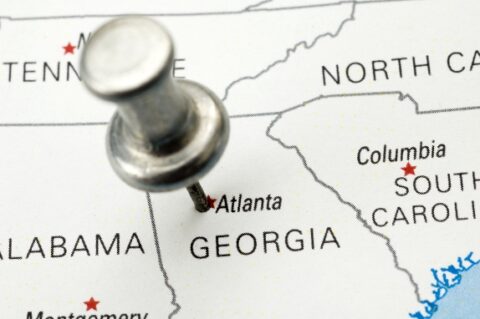Federal Courts/Jurisdiction

SCOTUS Narrows Protections For Noncitizens Who Received Poor Legal Advice
Almost three years ago, in the landmark decision Padilla v. Kentucky, the Supreme Court acknowledged the severity of deportation and that our current immigration laws make “removal nearly an automatic result” for many noncitizens convicted of crimes. Consequently, the Court held that a criminal defense attorney must advise noncitizen clients about the risks of deportation if they accept a plea bargain. If the defense attorney fails to provide this advice, the noncitizen can seek to have the conviction set aside. Such recourse brings integrity to the criminal justice and immigration systems and ensures that immigrants who reasonably rely on advice from their lawyers are not unfairly held accountable for their lawyers’ mistakes. Read More

Out of Legal Options, Alabama Files Petition at Supreme Court
Nearly five months ago, a federal appeals court in Atlanta issued a set of opinions that invalidated numerous provisions of Alabama HB 56, the most pernicious state immigration law in the country. After Alabama asked the full court to reconsider its rulings, the active judges unanimously rejected its request. Out of other legal options, the state filed a petition with the Supreme Court on Wednesday seeking to revive some (though not all) of the invalidated provisions. While the odds remain small that the Justices will take up the case, granting the petition could set up another legal showdown similar to the case over Arizona SB 1070. Read More

Supreme Court to Consider Reach of Padilla v. Kentucky
In its landmark decision in Padilla v. Kentucky, the Supreme Court confirmed that criminal defense attorneys have a constitutional obligation to advise their clients if pleading guilty to a particular offense could lead to deportation. On Thursday,* the Justices will consider a follow-up question of critical importance for many immigrants placed in removal proceedings on account of bad legal advice: whether the ruling applies to cases that became final before the decision was issued. Read More

Supreme Court Case Highlights Cruel Intersection of Immigration and Drug Laws
Tomorrow morning, the Supreme Court will hear arguments in a complicated immigration case involving how courts should determine whether a crime qualifies as an “aggravated felony.” Once the legal clutter is set aside, however, the case provides a clear example of how our nation’s immigration laws often fail to account for the most basic considerations of fairness and proportionality. If the Justices rule in the government’s favor, a lawful permanent resident with two U.S. citizen children could be deported from the country—and permanently barred from returning—for possessing less than $30 worth of marijuana. Read More

Why Kobach’s Lawsuit Against Deferred Action is Unlikely to Stand Up in Court
Kris Kobach’s official job title is Kansas Secretary of State. But he is better known for drafting—and being hired to defend in court—state and local immigration laws designed to make undocumented residents “self-deport.” His two most notorious undertakings are Arizona SB 1070 and Alabama HB 56, which have largely been eviscerated by federal courts. Yesterday, Kobach embarked on a new legal escapade, filing a lawsuit to block the Obama administration from granting deferred action to so-called “DREAMERers,” undocumented immigrants who arrived in the country as children. Fortunately, although sure to generate headlines, the lawsuit has little chance of standing up in court. Read More

Alabama Ruling Yet Another Rebuke to State Immigration Laws
As with the Supreme Court’s recent opinion on Arizona SB 1070, initial media coverage portrayed the (technically) mixed rulings on the Alabama and Georgia immigration laws as a split decision. But do not be fooled: yesterday’s opinions from the U.S. Court of Appeals for the Eleventh Circuit represent a sweeping win for the immigrants’ rights movement and a crushing blow to the legal crusade led by Kris Kobach. While yesterday’s victory was not unqualified, the provisions struck down by the Eleventh Circuit were far more significant than those that were upheld. Read More

BREAKING: Federal Court Strikes Down Major Provisions of Alabama, Georgia Immigration Laws
In a series of decisions issued Monday afternoon, a federal appeals court in Atlanta struck down major portions of controversial immigration laws passed by Alabama and Georgia—including a provision requiring public school officials to determine the immigration status of newly enrolling students. As the first decisions to be issued… Read More

Sheriff Joe Arpaio to Stand Trial on Racial Profiling Charges
Maricopa County Sheriff Joe Arpaio may finally face the music this week in a federal trial in Phoenix. The renowned anti-immigrant media glutton and self-proclaimed “America’s Toughest Sheriff” stands accused of discrimination and harassment charges in a class action lawsuit involving the ACLU and MALDEF. Arpaio has a long history of abuse and discrimination in the name of immigration enforcement—from a segregated tent city to unlawful stops and forcing inmates to wear pink underwear. In fact, Arpaio is also the subject of a lawsuit filed by the Department of Justice earlier this year alleging that Arpaio and his officers targeted Latino drivers during traffic stops and neighborhood sweeps and used ethnic slurs against Latino inmates in county jails. Read More

Some States Attempt to Move Forward on Immigration Laws Following Supreme Court Decision
Prior to the Supreme Court’s recent decision on Arizona SB 1070, other states that passed immigration laws were also embroiled in complicated legal battles. Alabama, Georgia, South Carolina, and Utah all passed restrictive immigration laws, parts of which were challenged in court and subsequently enjoined pending the Supreme Court’s ruling on Arizona. Now that the Supreme Court has ruled, however, each state is now attempting to interpret that ruling in an effort to implement its immigration law. Read More

Civil Rights Groups Resume Legal Challenges to Alabama’s Immigration Law
Less than three weeks after the Supreme Court’s landmark decision in Arizona v. United States—which struck down three provisions of SB 1070 and invited future challenges to a fourth—civil rights groups are back in court resuming their challenges to copycat laws in other states. Going forward, the lawsuits will focus more on how to interpret the Justices’ decision and less on theoretical legal questions about states’ rights. While the cases in Alabama and other states may take years to resolve, it is already clear that parts of the laws will be immediately struck down. Read More
Make a contribution
Make a direct impact on the lives of immigrants.
